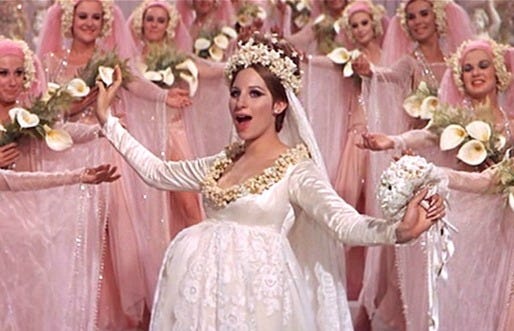Funny Girl (1968)

Not since "Cyrano de Bergerac" has a nose been so central to a film's conception.
José Ferrer's was fake, of course, in the 1950 classic, while Barbra Streisand's was all natural in "Funny Girl" 18 years later. However, both noses operate the same way for the two characters: as their totem, their calling card, the object of their self-doubt and the source of greatest vanity. Both Cyrano and Fanny Brice make their outsized proboscises the nexus of their self-identity.
The first half of "Funny Girl" is all about how Fanny Brice became a Broadway star despite less-than-standard-gorgeous looks. Of course, the Broadway musical that formed the basis for the movie centered around the persona of Streisand, and her distinctive facial features became part and parcel of the package. Fanny Brice had a rather large honker herself, and (in)famously underwent a nose job in 1923.
This is where the movie is a sheer delight, as Brice constantly pokes fun of herself. After struggling in low-rent shows for months, she finally gets called up to the big leagues by "Flo" Ziegfeld (Walter Pidgeon) and balks at being asked to perform a song written for a conventionally pretty bride. ("I am the beautiful reflection of my love's affection...")
Instead, she appears onstage opening night with a pillow under her dress, simulating pregnancy, and sings in a risque Mae West style. But then confronted with other gorgeous brides, she reacts as if slapped when placed face-to-face with their heaving bosoms and cries out in despair when a mirror is held up to her own face.
This is funny, endearing stuff, and Brice later makes clear her intention: She wants people to laugh with her to prevent them from laughing at her. She knows she's not beautiful but firmly believes she's got the talent and the moxie to be a huge star. The first act of the film is about her convincing the rest of the world what she already knew.
The middle section is taken up with her budding romance with gambler Nick Arnstein (Omar Sharif). Much is made of Sharif's dusky handsomeness, and there are several charming bits where Brice is both enraptured and vexed about nabbing a man so good-looking. One of her lyrics about their impending marriage comments that the groom will be prettier than the bride.
Then the film goes into a dark-and-dreary phase for the last hour or so, as Nick's success is overshadowed by Fanny's. He becomes increasingly desperate to reassert his position as head of household and chief breadwinner, eventually leading him to an embezzlement conviction that sends him to jail for two years. They meet, briefly, at the film's end and agree to divorce.
On the one hand, it's always bracing to see a mainstream Hollywood film that doesn't conclude in the most obvious and expected way. A mainstream romantic film in which the couple splits up permanently in the end? That's pretty bold stuff for 1968.
Of course, the filmmakers couldn't completely depart from the real history of Fanny Brice, who had another high-profile marriage after the one to Arnstein. (Unbeknownst to me until recently, this was chronicled in a much more lightly regarded 1975 sequel, "Funny Lady.")
Not that they don't bother changing things around quite liberally. For instance, the movie ignores the fact Fanny had already been married once before when she met Nick. And she's depicted as living in a lively blue-collar neighborhood, when Fanny's upbringing was actually quite comfortable. Screenwriter Isobel Lennart, who also wrote the book for the stage version, is obviously working in the "inspired by" mode of cinematic biography.
Not coincidentally, most of the songs occur before the final, sturm-und-drang portion. Now that I think about it, the only one I can recall toward the end is the showstopper finale of "My Man" — an actual favorite that the real Fanny often sang. There's also the hilarious "Second Hand Rose," "Don't Rain On My Parade," "I'd Rather Be Blue Over You" and perhaps the film's most famous song, "People." I'm not a big fan of the latter — it's smarmy and unmelodious to these ears — but it went on to be a huge popular hit.
Sharif even gets elbowed into singing a couple of duets with Streisand. He wisely resorts to some low-key talk-singing in the Rex Harrison mode and gets out of his leading lady's way.
Whatever you want to say about Streisand as a performer, there's no denying she's a home-run queen as a singer. The emotion and personal style she puts into her songs is such a thrill. Though she's also quite good in the dramatic scenes, I think it was her self-deferential comedy and amazing singing that put her over the top with Academy Award voters, who gave her the Best Actress Award (which she shared that year with Katharine Hepburn, in a rare tie).
It was well-deserved, and announced Streisand as a major film star — and later, filmmaker.
Director William Wyler, who was reaching the end of his great career and had never made a musical before, knew exactly how to photograph his star and get a great, brassy performance out of her. In this case, I think it was simply enhancing the persona that was already there rather than getting Streisand to convince the audience she was something she's not. But still, a smart filmmaker sticks with what works.
Streisand had already been pretty famous before her movie debut, but "Funny Girl" will live forever for presenting a bold, slightly crooked new face to the world that nobody would soon forget.
4 Yaps



